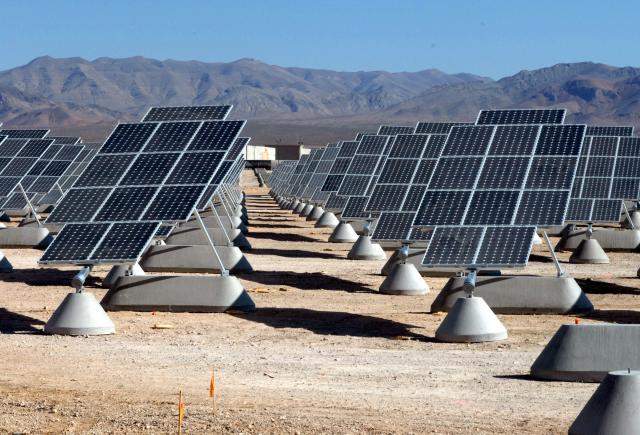Reducing demand, finding alternative energy sources and improving the energy security of military operations are among the goals of the Defense Department’s operational energy strategy, a senior Pentagon official said here July 19.
Sharon Burke, the assistant secretary of defense for operational energy plans and programs, described the strategy during an Army and Air Force energy forum.
“(The strategy is) going to guide the entire department in how we use energy for military operations,” Burke said. “It’s the framework for moving forward with our energy challenges.”
Defense Secretary Leon Panetta has warned of a changing security environment and its effects on operational energy demand, she noted.
“Improving our energies could not only improve our military effectiveness and our ability to operate in the world, but it is also important to our readiness,” Burke said. “Secretary Panetta, in his short time in office, has already cautioned us all that we need to have humility in predicting the shape or direction of future conflicts. … So energy is a part of that changing security environment, but it’s also part of that adaptation, and how we better prepare for this changing world and the possibility of strategic surprise.”
Burke told the audience that changing the way the Defense Department uses energy at home and abroad is strategically significant.
“In today’s operations, we haul fuel and other supplies across very challenging circumstances in Afghanistan, across difficult terrain and dangerous roads,” she said. “At home, our critical infrastructure, which sustains military operations abroad, depends on the civilian electric grid. … The more that we can lighten that dependence, whether on the grid, or (by) our Soldiers, Sailors, Airmen and Marines overseas, the more resilient we are to that changing strategic landscape.”
Burke also emphasized the need for a responsible reduction in government spending, and the role the Defense Department’s operational energy strategy plays in that effort.
“Managing our military under these circumstances will be a challenge for all defense policy makers,” she continued, “and our challenge is to adjust to our fiscal circumstances and sustain our military effectiveness today and far into the future.”
Budget considerations should not dictate strategic priorities, Burke said. “But we will need to be realistic with how we execute that strategy with fewer resources,” she added.
That’s where the operational energy strategy unveiled last month by Deputy Defense Secretary William J. Lynn III has an especially important role, Burke said.
For example, she said, an experimental site on Fort Devens, Mass., is testing a camp kit that incorporates advances in power generation and distribution, insolated shelters, water re-use systems and waste management.
In addition, Burke said, the Air Force’s Air Mobility Command is making innovative process changes ranging from reducing aircraft weight to more efficient routing, to better cargo loading.
“That’s expected to save over a half-billion dollars over the next five years,” she added.
“These programs are tests, (but) we have more to do,” Burke said. “We need operational energy incorporated into our readiness training, but this is really important to be able to take this out to the field and show that it can work. And that it can give us better military effectiveness on the ground with our Soldiers.
“And the services aren’t waiting to do this — they’re doing (it),” she added.
The strategy will not end or fade away with the return of U.S. troops from Iraq and Afghanistan, Burke said.
“This is, fundamentally, a readiness challenge,” she said. “We always need to be ready to conduct missions wherever we are, and that means we have to be ready whether we have forces in the field or not. If we’re successful at looking at it that way, … we’ll have a military that’s better able to respond to any challenge or any threat anywhere in the world.”
Ultimately, Burke said, she hopes the changes brought forth by the new operational energy strategy will improve the nation’s overall energy readiness.
“I sincerely hope that in improving the energy security and energy readiness of our armed forces, that the department will have made a larger contribution to the energy security of the whole nation,” she said. “I think (this new strategy is) the way we’re going to do it.”










